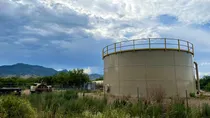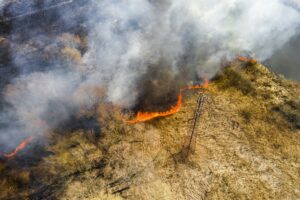PHOENIX — The U.S. Environmental Protection Agency is demanding the U.S. Air Force and Arizona National Guard take action as concentrations of toxic “forever chemicals” are increasing in the groundwater in a historically contaminated area in the south side of Tuscon, Arizona.
The EPA found the pollution came from the nearby military properties and ordered them to clean up the contamination. High concentrations of PFAS, or per- and polyfluoroalkyl substances, were detected in Tucson’s groundwater near the Tucson International Airport at the National Guard base and at a property owned by the U.S. Air Force.
The contaminants threaten the groundwater extracted at a water treatment run by Tucson Water in the Tucson Airport Remediation Project area, known as TARP. That water was intended for drinking, the EPA said in its May 29 order.
Samples taken at the treatment plant showed concentrations of PFAS as high as 53,000 parts per trillion, which is 5,300 times the allowable amount. The limit allowed in drinking water ranges from 4 parts per trillion to 10 parts per trillion, depending on the type of PFAS.
To prevent the contaminations’ further migration towards city wells, the agency gave the Air Force and the Air National Guard 60 days to develop a remediation plan. The Morris Air National Guard Base leading the remediation project did not respond to the Arizona Republic, part of the USA TODAY Network, and its requests for comment.
Tucson Water, the city’s water utility, said the wells impacted by the contamination are not in service and customers are not being served contaminated water. But with concentrations of PFAS continuing to increase, the issue remains a concern for the city.
“When we have an area where the water quality is impacted and we’re not able to serve that to customers, that is an added cost. It really diminishes the resource that we have available,” Natalie DeRoock, a Tucson Water spokesperson said. She noted that other than the Colorado River water the city pumps in, Tucson depends on groundwater, a finite resource.
Get the Daily Briefing newsletter in your inbox.
The day’s top stories, from sports to movies to politics to world events.
Delivery: DailyYour Email
The water utility stopped serving water treated at TARP to residents in 2021, when increased PFAS levels caused the plant to temporarily shut down as the filter system sequestering the contaminants could not handle the increase.
What are PFAS?‘Forever chemicals’ are common and dangerous.
What will remediation look like?
DeRoock said the water treated at the TARP facility exceeds state and county standards for clean water, so the city decided to divert the water to the Santa Cruz River rather than use it as drinking water. She said the city wanted people to feel confident about their drinking water, and instead decided to use that water to maintain the water levels in the Santa Cruz River and to help with the riparian habitat restoration.
As part of the EPA’s order, the remediation plan submitted by Air Force and National Guard must ensure the water is clean enough to be used as drinking water.
“With appropriate response, Tucson Water would be able to resume delivering water from the TARP facility to the drinking water system, as it was originally designed to do,” said Joshua Alexander, a spokesperson for the EPA.
Alexander said remediation is a complicated process that could take years. It could require the creation of new water treatment facilities or the modification of current existing facilities to treat an increased volume of water.
He noted several technologies that successfully remove PFAS from water, including granular activated carbon, a filtration system that uses carbon to remove contaminants from drinking water. He pointed out that new technologies are also being developed worldwide to remove PFAS from drinking water.
PFAS is a danger to public health
PFAS are long-lasting chemicals that have been used since the 1940s in a wide range of industries and products — from fire retardants and popcorn bags to personal care items and clothing — that can now be found globally in water. PFAS are considered hazardous substances that can cause severe health issues with long-term exposure, even in low traces.
Studies show PFAS exposure can negatively impact the body’s immune and cardiovascular systems, as well as vaccine response. Studies have also linked oral exposure to PFAS to adverse health effects on the liver, the kidneys, and the immune system, and cancer, according to the EPA.
Though residents in Tucson’s south side don’t receive water from TARP’s contaminated wells, past exposures and their effects worry residents. Many contend broader health screenings and compensation are still due.
Site has long history of contamination
The area has a history of contamination from decades of defense and industrial activities. The Tucson Airport Remediation Project area is a superfund site contaminated with several pollutants.
One of the primary contaminants is trichloroethylene, or TCE, formerly used as a general-purpose solvent and degreaser. Another contaminant found at the site is 1,4-dioxane, which was used as a stabilizer to enhance the life of the solvent bath for degreasing manufactured parts.
These and other hazardous materials were disposed of at the airport and eventually began seeping into the groundwater, contaminating the regional aquifer. The area was declared a superfund site in 1983 and listed as a national priority area for long-term cleanup.
Other contaminants at the site include dichloroethene, chloroform, and chromium. A carcinogenic compound, polychlorinated biphenyls, and metals contamination were also found in some soils on the site. According to the Arizona Department of Environmental Quality, the “contaminants of concern” may change as new data becomes available.
Author: Bagombeka Job
Credit:: USA TODAY











































